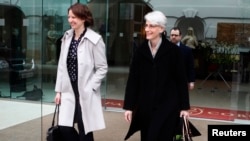VIENNA —
Negotiators from Iran and a group of six world powers are meeting Tuesday in Vienna to discuss a long-term agreement to ensure Iran's nuclear program is peaceful.
Iran says it has no interest in building a nuclear weapon, but the U.N. Security Council and many experts believe it is dangerously close to being able to do so, and wants changes to ensure it cannot.
The highly anticipated talks, which follow an interim deal in November that calls for Iran to cut back its most sensitive nuclear activity in exchange for limited sanctions relief, lasted just 45 minutes. Afterward, officials went into a series of often more productive bi-lateral sessions.
“During these negotiations on the comprehensive agreement, all concerns about the Iranian nuclear program will have to be addressed," said Michael Mann, spokesman for EU foreign policy chief Catherine Ashton. "The overall objective remains to seek a comprehensive solution that would ensure that Iran’s nuclear program is exclusively peaceful.”
Ashton, who is leading negotiations for the six world powers — the United States, Britain, China, France, Russia and Germany — held a meeting Monday night with Iranian Foreign Minister Javad Zarif.
Despite November's breakthrough negotiations, some officials are giving today's talks no better than an even chance of reaching an accord. On Monday, Iranian Supreme Leader Ayatollah Ali Khameini said he expects talks to “lead nowhere,” but that he believes effort should continue. President Barack Obama has said he gives the talks no more than a 50-percent chance of success.
New Iranian President Hassan Rouhani, who has much politically at stake in these talks, wants to deliver an improved economy to the Iranian people, which would require ending economic sanctions via a deal.
But according to nuclear policy expert Mark Hibbs of the Carnegie Endowment for International Peace, top officials in Tehran may not be comfortable accepting the deep cuts to their nuclear program that the talks are calling for.
“They are going to require Iran to make concessions and commitments over a very long period of time which circumscribe and indeed cut back the scope of the program," said Hibbs.
Mann on Tuesday would not provide details of the talks and did not know what sort of schedule the negotiators would follow. An Iranian official called the morning session a “very good beginning,” but said even deciding on an agenda for the future would be “a lot.”
Speaking on the condition of anonymity, a senior U.S. official who had said he expected today's talks to be “complicated, difficult and lengthy,” said a working relationship has developed with Iranian officials that did not exist before last year’s talks, and that implementation of the interim agreement reached in November is going smoothly.
Iran says it has no interest in building a nuclear weapon, but the U.N. Security Council and many experts believe it is dangerously close to being able to do so, and wants changes to ensure it cannot.
The highly anticipated talks, which follow an interim deal in November that calls for Iran to cut back its most sensitive nuclear activity in exchange for limited sanctions relief, lasted just 45 minutes. Afterward, officials went into a series of often more productive bi-lateral sessions.
“During these negotiations on the comprehensive agreement, all concerns about the Iranian nuclear program will have to be addressed," said Michael Mann, spokesman for EU foreign policy chief Catherine Ashton. "The overall objective remains to seek a comprehensive solution that would ensure that Iran’s nuclear program is exclusively peaceful.”
Ashton, who is leading negotiations for the six world powers — the United States, Britain, China, France, Russia and Germany — held a meeting Monday night with Iranian Foreign Minister Javad Zarif.
Despite November's breakthrough negotiations, some officials are giving today's talks no better than an even chance of reaching an accord. On Monday, Iranian Supreme Leader Ayatollah Ali Khameini said he expects talks to “lead nowhere,” but that he believes effort should continue. President Barack Obama has said he gives the talks no more than a 50-percent chance of success.
New Iranian President Hassan Rouhani, who has much politically at stake in these talks, wants to deliver an improved economy to the Iranian people, which would require ending economic sanctions via a deal.
But according to nuclear policy expert Mark Hibbs of the Carnegie Endowment for International Peace, top officials in Tehran may not be comfortable accepting the deep cuts to their nuclear program that the talks are calling for.
“They are going to require Iran to make concessions and commitments over a very long period of time which circumscribe and indeed cut back the scope of the program," said Hibbs.
Mann on Tuesday would not provide details of the talks and did not know what sort of schedule the negotiators would follow. An Iranian official called the morning session a “very good beginning,” but said even deciding on an agenda for the future would be “a lot.”
Speaking on the condition of anonymity, a senior U.S. official who had said he expected today's talks to be “complicated, difficult and lengthy,” said a working relationship has developed with Iranian officials that did not exist before last year’s talks, and that implementation of the interim agreement reached in November is going smoothly.




